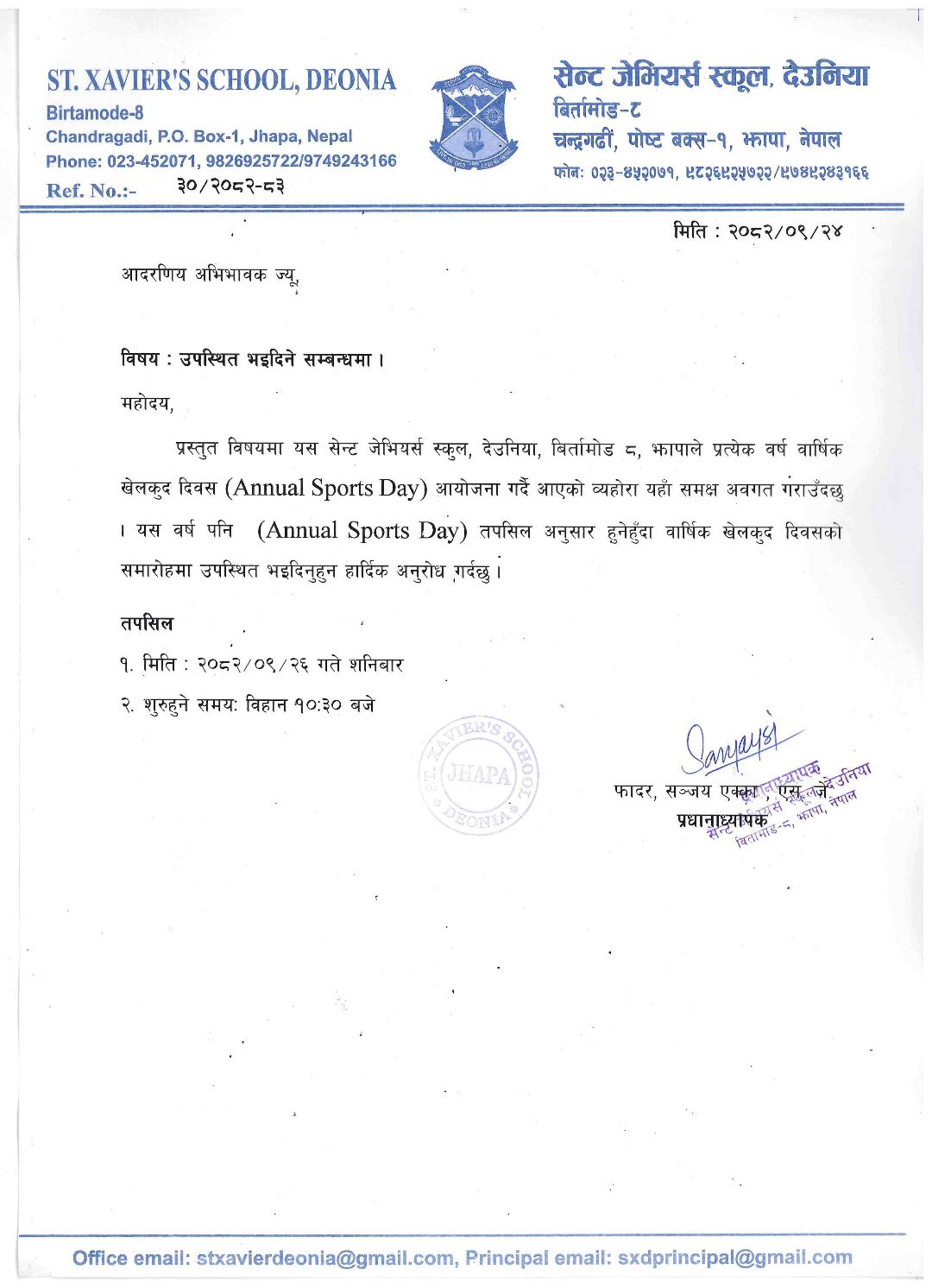Learn More about SXD
Learn More about SXD
St. Xavier’s School
(A Jesuit Institution)
Deonia, Birtamode – 8
Post Box 1, Chandragadi, Jhapa, Nepal Phone: 023-452071
9826925722, 9749243166
School Office: [email protected]
Account Office: [email protected]
Principal’s Email: [email protected]
Class hours: Sun–Thur
- Classes 6 – 10
8:40 am – 3:40 pm - Classes 1 – 5
9:40 am – 2:40 pm - Classes 11 – 12
6.30 am – 11. 30 am
School office hours: Sun-Fri
7:15 am – 12:15 pm and 9:00 am-3:00 pm
Office hours for fees: Sun–Thur
9:00 am – 11:50 pm and 12:25 am – 3:30 pm
The Principal may be seen on class days from 11:00 am to 12:00 pm and at other times by appointment.
No school business will be transacted on Saturdays and Holidays.
ACADEMIC YEAR
The academic year starts in April (Baisakh) and ends in March (Chaitra). The academic year is divided into three terms. Detail of the academic year is provided in the school calendar.
Vision
Our educational postulate aims to accompany persons to achieve fullness in life. Our Education enables students to become effective agents of social change and persons with and for others.
Mission Statement
We, the management and staff of St. Xavier’s School, Deonia, are a community of educators. We commit ourselves, along with parents, to transforming the society by developing our students physically, emotionally, intellectually and spiritually and by instilling in them love of God and country. We strive to form Competent, Committed and Compassionate students who will be men and women for others living out the values of truth, justice and equality.
OUR GOALS AND OBJECTIVES
Our educational apostolate aims at accompanying persons to achieve fullness in life and integral development. Our education enables students to become effective agents of social change and persons with and for others. A successful Xavierian is one who has distinguished himself/herself in the service of others. The school strives to achieve academic excellence as well as social excellence. Our aim is to provide an education that prepares students to live a meaningful life, as well as one that will unite and equalise social and economic groups in society.
In keeping with the purpose of Jesuit education, St. Xavier’s School strives towards the following objectives:
- Spiritual and moral objectives: The students shall show tolerance for the religious convictions of others and respect the rights and dignity of others.
- Intellectual objectives: The students shall systematically develop their powers of observation, imagination, thinking, reasoning, understanding, communicating, interacting, affirming habits, attitudes, and values.
- Social and civic objectives: The students shall acquire knowledge and appreciation of Nepali culture and shall become active agents of change for the purpose of bringing about a better and just society.
- Aesthetic objectives: The students shall develop an appreciation for the beauty of God reflected in the Universe through the arts and other means of creative expression that enrich the quality of human life.
- Physical and mental health objectives: The students shall develop physical fitness and emotional health, maturity and a wholesome personality.
- Environmental objectives: The students shall develop a sense of respect and appreciation for everything else that is part of the Universe. They shall acquire knowledge that will make them champions of caring for our Common Home.
In academics, the school follows the curriculum prescribed by the Education Department of the Government of Nepal. The school focuses on programmes and activities which will help the students to grow in different areas: physical, intellectual, spiritual and psychological. Thus, games are compulsory at SXD, and other extracurricular activities are highly emphasised. Even though both English and Nepali are taught here and emphasised, the language of the school is ENGLISH. The school rule for students is to speak good/correct English at all times inside the school compound, in the bus and at school bus stops. During class time, answers and comments made by students should be given in complete, correctly phrased English sentences. Value education for the non-Christians and catechism for the Christians are compulsory in the school.
The years the students spend in the schools should enable them to acquire sound principles of conduct and action as well as lay a solid foundation of true and purposeful living when they attain adulthood. Principles of honesty, trust, cooperation, self-reliance, and hard work are inculcated through various activities. In these activities, students learn to think for themselves under the steady supervision of moderators. With activities, students are given the opportunity to see practical applications of abstract ideas like “give and take” that they learn in the classroom.



